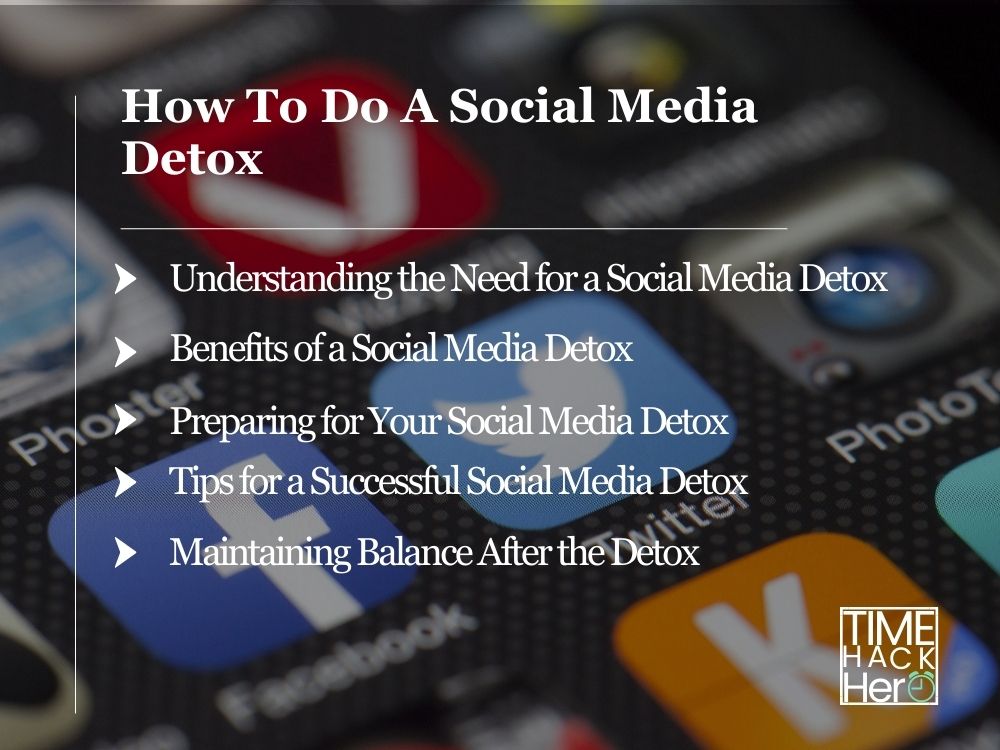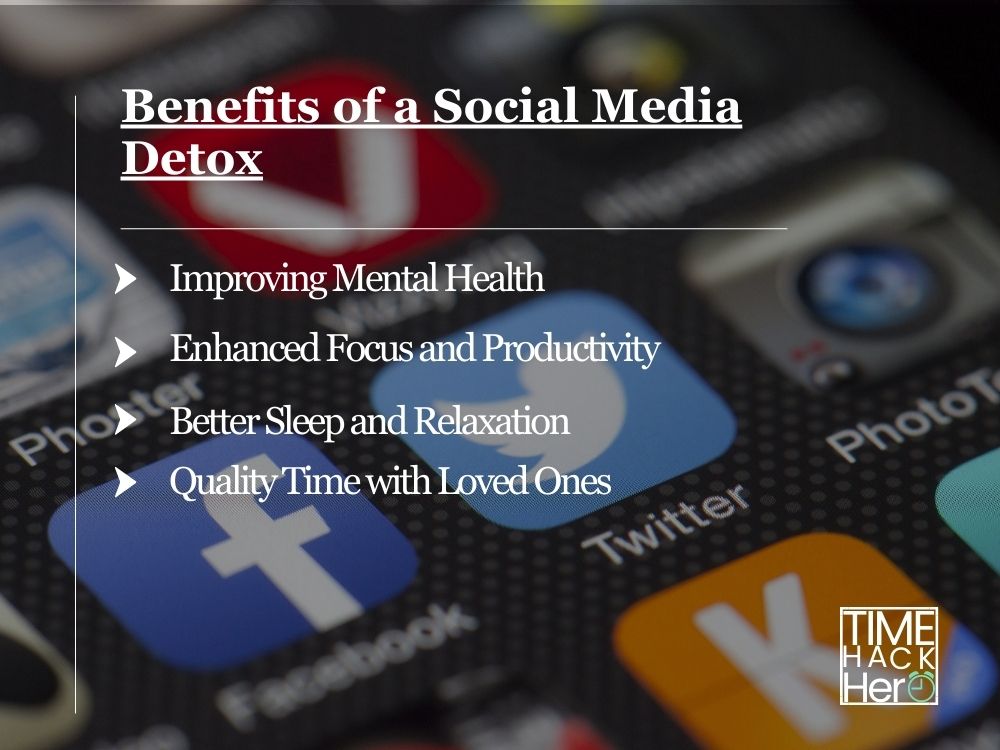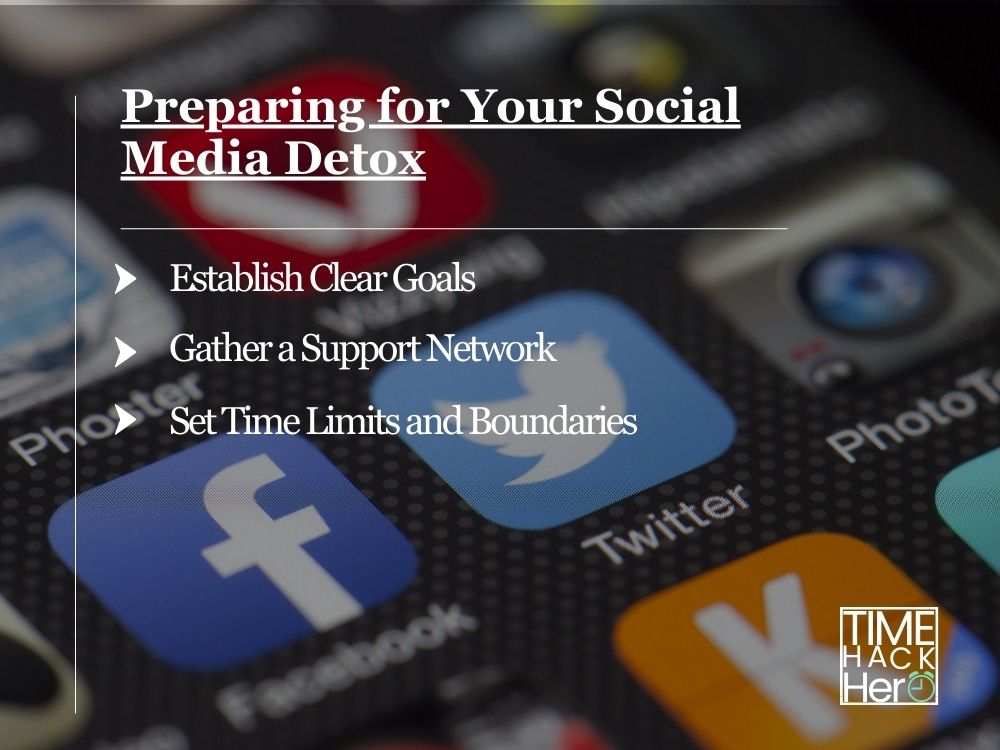In today’s fast-paced digital age, the habitual use of social media can lead to feelings of overwhelm, anxiety, and even addiction. As a result, it is crucial to take a step back and consider a social media detox. By temporarily disconnecting from these platforms and reevaluating how we consume information, we can find balance and improve our mental well-being.
A social media detox involves intentionally refraining from using social media platforms like Facebook, Instagram, and Twitter for a specific period, often ranging from a few days to several months. This break can provide the necessary space to rediscover meaningful connections, realign priorities, and regain control over one’s time and attention.
Engaging in a social media detox allows the brain to recalibrate, reducing stress levels and presenting opportunities to develop healthier habits when it comes to technology use. So, by embracing this digital minimalism, individuals can experience renewed energy and a more fulfilling daily routine.
Table of Contents
Understanding the Need for a Social Media Detox
Effects of Social Media on Mental Health
Although social media has transformed the way we connect with others, it can also lead to several negative effects on our mental health. Continuous usage of social media platforms can cause:
- Anxiety and Depression: Excessive use of social media can exacerbate feelings of anxiety and depression by constantly exposing users to others’ seemingly perfect lives.
- FOMO (Fear of Missing Out): Social media can fuel FOMO, leading individuals to feel left out and like they need to participate in every event to maintain their social status.
- Decreased Focus and Productivity: Constant notifications and alerts from social media platforms can cause distractions, making it difficult to maintain focus and productivity in daily tasks.
- Comparison: Social media often encourages users to compare their lives to those they follow, leading to feelings of inadequacy and dissatisfaction.
Signs of Social Media Addiction
It is essential to recognize the signs of social media addiction as early as possible. Some common indicators include:
- Spending excessive amounts of time on social media, even at the expense of social interactions and daily activities
- Constantly checking your phone for updates and notifications, even when there is no need to do so
- A decline in productivity due to distractions from social media
- Neglecting personal and professional responsibilities to use social media
- Experiencing withdrawal symptoms, such as irritability, when unable to access social media
If you find yourself experiencing some or all of these symptoms, it may be time to consider a social media detox to regain control of your habits and improve your overall mental health.
Benefits of a Social Media Detox
Improving Mental Health
Taking a break from social media can have a positive impact on your mental health. Research has shown that excessive use of social media can lead to increased levels of depression, anxiety, and feelings of isolation1. When you stop scrolling and comparing your life to others, you may experience improved self-esteem and reduced feelings of envy.
Enhanced Focus and Productivity
Limiting your exposure to social media can free up more time for concentrating on your goals and daily tasks. It’s easy to get lost in endless scrolling, but taking a break from these distractions enables you to refocus your attention on essential tasks, leading to an increase in productivity.
Better Sleep and Relaxation
Spending excessive time on social media, particularly before bedtime, can disrupt sleep patterns and impact the quality of your sleep2. Reducing your screen time and social media consumption enables your body and mind to relax more efficiently, leading to improved sleep and overall well-being.
Quality Time with Loved Ones
Time spent on social media often takes away from the moments spent engaging with loved ones. A social media detox encourages you to have in-person interactions and develop deeper connections with family and friends. Building and maintaining these relationships can lead to a more fulfilling, higher quality of life.
Preparing for Your Social Media Detox
Establish Clear Goals
Before embarking on your social media detox journey, it is crucial to define your goals. Make a list of objectives that you want to achieve during this period. Examples might include:
- Reducing anxiety and stress associated with digital platforms
- Increasing face-to-face communication with friends and family
- Finding more time to engage in hobbies or exercise
Setting realistic expectations also helps to ensure that your detox experience is meaningful and productive.
Gather a Support Network
Social media detox can be challenging due to fear of missing out (FOMO) and potential feelings of loneliness. Enlisting the help of friends and family to hold you accountable throughout your detox can be invaluable. Steps to gather a support network include:
- Informing your closest connections about your intent to detox
- Requesting that they check in with you periodically to provide encouragement
- Suggesting offline activities or meet-ups to maintain social connections during your detox
Having this support system in place can significantly improve your chances of success and help maintain a healthy balance between digital connections and real-life relationships.
Set Time Limits and Boundaries
One of the most critical aspects of a successful social media detox is setting limits and boundaries around your digital usage. Examples of proactive steps you can take include:
- Deactivating your accounts to prevent accidental or impulsive usage
- Placing a rubber band around your phone to create a physical reminder of your detox
- Allocating specific time in the day to activities that are meaningful and align with your goals
By consciously setting these limits and maintaining self-discipline throughout your detox, you enhance the likelihood of lasting positive change in your relationship with social media.
Tips for a Successful Social Media Detox
Turn off Notifications and Set App Limits
One essential step to begin a successful social media detox is to turn off notifications for apps like Instagram, Facebook, Twitter, YouTube, LinkedIn, and TikTok. This will reduce the urge to mindlessly check your phone whenever a notification pops up. Additionally, setting app limits can help manage your time spent on these platforms, ensuring you don’t get sucked back into the digital world.
Create a Daily Routine Without Social Media
Establishing a daily routine that doesn’t involve social media can help you transition into an offline lifestyle more effectively. Incorporate small changes into your daily routines, such as:
- Mornings: Start your day with a healthy breakfast or a workout instead of checking social media.
- Work breaks: Go for a walk, read a book, or chat with a colleague in person during your break.
- Bedtime: Replace scrolling through your phone with a relaxing activity like reading or journaling.
Replace Social Media with New Hobbies and Interests
Instead of scrolling through social media during your free time, use that time to explore new hobbies or interests. Some ideas include:
- Physical activities: hiking, dancing, swimming, or yoga
- Creative pursuits: painting, cooking, writing, or playing an instrument
- Learning opportunities: taking up a new language, attending workshops, or enrolling in online courses
Meditation and Mindfulness Practices
Integrating meditation and mindfulness practices into your daily routine can help alleviate stress and create a stronger mental focus. Inner peace and mindfulness can also help you resist the temptation to check your social media accounts.
- Yoga and meditation: Practice these techniques to relax, reduce stress, and improve mental clarity.
- Mindful breaks: Step away from your smartphone and engage in a brief meditation or deep-breathing exercise.
Establish an Accountability System
Having someone to hold you accountable during your social media detox can be extremely beneficial. Share your plan with friends, family, or a support group to ensure you stay on track. Having an accountability system in place will make it easier to resist the temptation to log back in to your accounts.
By following these tips, you can successfully embark on a social media detox journey and improve your overall digital habits.
Maintaining Balance After the Detox
Reevaluate Your Social Media Use
After completing your social media detox, take some time to reflect on how you were using social media apps in the past. Ask yourself which platforms were consuming more of your time and whether their impact on your life was positive or negative. This reflection period will help you decide which social media platforms are truly worth reintegrating into your life. Additionally, consider customizing your feeds to include more positive, inspiring, and informative content.
Set Boundaries for Future Use
To maintain balance and avoid falling back into old habits, set limits on your social media use. Create a schedule with designated screen time for each platform to ensure you are using social media as a tool, rather than an unhealthy distraction. You can also use built-in features on smartphones to help set time limits for specific apps. Consider implementing a “no screens” policy during certain times of the day, such as mealtime or before bedtime.
Continue Prioritizing Offline Activities and Relationships
During your detox, you likely discovered the value of engaging more with offline activities and relationships. After reintegrating social media into your lifestyle, be sure to continue prioritizing these elements in order to maintain balance. Here are a few examples:
- Participate in hobbies and activities that don’t involve a screen, such as sports, reading, or crafts.
- Spend quality time with friends and family without the presence of social media.
- Engage more with your physical surroundings by going for walks or exploring new places.
By following these guidelines, you can effectively maintain balance after your social media detox, ensuring a healthier relationship with digital platforms in the long term.




